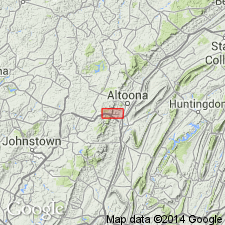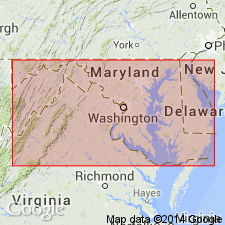
- Usage in publication:
-
- Pocono Formation
- Modifications:
-
- Revised
- AAPG geologic province:
-
- Appalachian basin
Summary:
Pg. 20, 21. Pocono Formation. A.D. Leonard (unpub. thesis) termed the upper and lower divisions of the Pocono at Jim Thorpe, Bear Mountain Member and Silkmill Run Member, respectively. These members likewise were found in ridges along the rim of the Northern Anthracite Field in central Pennsylvania, where they are overlain by a body of calcareous sandstone designated Abrahams Creek Member. Age is Mississippian.
Area of report is Horse Shoe curve, between Altoona and Gallitzin, [Altoona 15-min quadrangle], Blair Co., central PA.
Source: US geologic names lexicon (USGS Bull. 1350, p. 5, 51-52, 693).

- Usage in publication:
-
- Pocono Formation
- Modifications:
-
- Areal extent
- AAPG geologic province:
-
- Appalachian basin
Summary:
Author proposes herein that Rockwell and Purslane Formations be used instead of Pocono in MD, as strata bear little resemblance to type Pocono.
Source: GNU records (USGS DDS-6; Reston GNULEX).
For more information, please contact Nancy Stamm, Geologic Names Committee Secretary.
Asterisk (*) indicates published by U.S. Geological Survey authors.
"No current usage" (†) implies that a name has been abandoned or has fallen into disuse. Former usage and, if known, replacement name given in parentheses ( ).
Slash (/) indicates name conflicts with nomenclatural guidelines (CSN, 1933; ACSN, 1961, 1970; NACSN, 1983, 2005, 2021). May be explained within brackets ([ ]).

